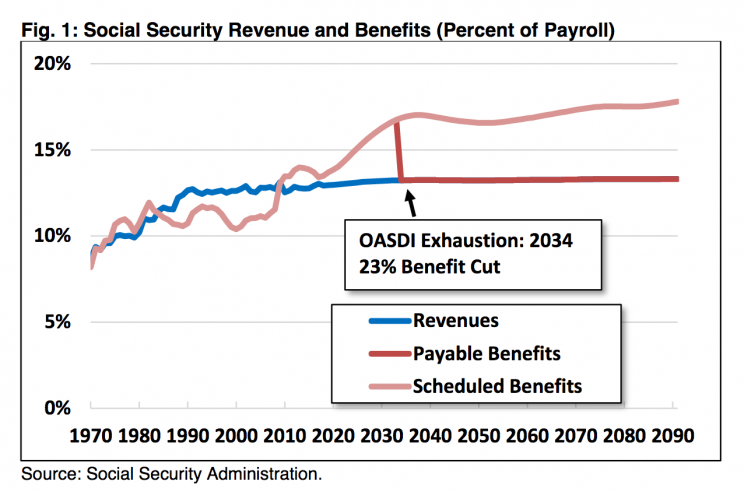Social Security on track for 'large, abrupt' cuts in 17 years unless Congress acts
The Social Security and Medicare trustees issued their 2017 annual report on Thursday, and it began with an alarm bell.
“Both Social Security and Medicare face long-term financing shortfalls under currently scheduled benefits and financing,” the trustees wrote in the summary of the 268-page document. “The Trustees recommend that lawmakers take action sooner rather than later to address these shortfalls.”
The Trustees also projected the biggest increase in payouts in years—a 2.2% increase—which comes to an average of about $28 per person.
Insolvency is on track for 2028 for the disability fund and 2034 for seniors. Insolvent, however, does not mean empty; it means that the funds would not be able to completely fulfill its debts to the public. It’s not as bad as a $0 check sent to American seniors, but the stakes are still high.

As the Committee for a Responsible Federal Budget, a non-partisan group dedicated to balancing the budget, noted in a paper on Friday, the cuts would be “large” and “abrupt” and growing from 23% in 2034 to 27% in 2091. The late-century date may prove reassuring to some, but a 23% cut takes the average
Social Security benefit payout from around $1,400 to $1,080. This would be a significant blow.

A root cause for the financial woes for Medicare and Social Security is the aging baby boomer population, and the trustees estimate the cost jumps will be higher than any GDP growth that could potentially offset things. Meanwhile, lawmakers have not made progress addressing the difference between these two numbers by raising more money, raising the retirement age or dialing back payments.
“The gap is getting bigger, and politicians have their heads in the sand,” said Marc Goldwein of the Committee for a Responsible Federal Budget.
Politically, the available options are incredibly explosive. Raising taxes is unpopular, and restricting payments to seniors is also unpopular. This leaves both Democrats and Republicans at an impasse.
Ways to save the program
Lawmakers have proposed changing how benefits are calculated, raising the payroll tax slightly, or subjecting all wages to payroll taxes (right now, wages up to $127,200 get taxed for Social Security). The CRFB has a tool that lets people model the Social Security fund to see how different policy solutions would keep the program solvent.
For example, raising the payroll tax 0.7% and subjecting all wages to payroll tax would keep the program solvent for another 75 years. However, it would still be on a road to running out.
On the benefit-cutting side, slowing benefit growth for the top 70% of earners, increasing the retirement age, and modifying cost-of-living adjustments would close the funding gap, but also not permanently.
Ethan Wolff-Mann is a writer at Yahoo Finance focusing on consumer issues, tech, and personal finance. Follow him on Twitter @ewolffmann. Got a tip? Send it to tips@yahoo-inc.com.
Have you recently complained to a company about a problem such as a faulty product, bad service or wrongful charge? Did you get compensation? Take our survey and tell us about the experience.
Read More:
Sometimes fake holidays like ‘National Ice Cream Day’ actually work
A robot lawyer can fight your parking tickets and much more
Consumer watchdog is making it easier for consumers to sue banks
Cable’s new strategy? You can pay $5 to avoid commercials
How ringless spam voicemails became a partisan issue
How TripAdvisor hunted a robocaller that made 100 million calls to random people
Uber’s series of scandals has yet to put a dent in ridership

 Yahoo Finance
Yahoo Finance 